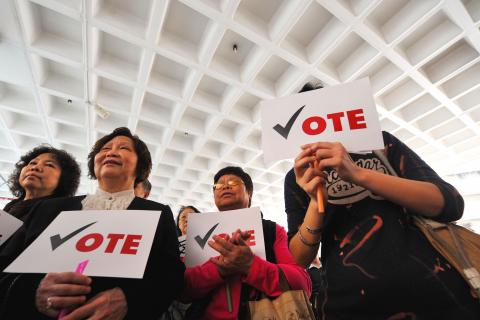A university Web site offering ordinary Hong Kongers a chance to vote for their next leader ahead of tomorrow’s election is under “systematic attack” from hackers, organizers said yesterday.
Thousands of people who do not have the right to vote in the tightly controlled “small-circle election” are expressing their views through the unofficial poll organized by the University of Hong Kong.
“The system has been very busy,” Robert Chung (鍾庭耀), director of the university’s respected Public Opinion Programme, told Cable TV. “We suspect it is under systematic attack as there are over 1 million clicks on our system every second.”

Photo: AFP
Chung did not indicate who could be responsible for the disruption, but his team of pollsters has a history of aggravating authorities in Beijing with surveys indicating public opinion that is at odds with Beijing’s official line.
The vast majority of Hong Kong’s 7 million residents have no right to determine who will replace Honk Kong Chief Executive Donald Tsang (曾蔭權), whose term expires in June, as the financial center’s next leader. The vote is restricted to a 1,200-member committee packed with pro-Beijing elites, who will cast their ballots tomorrow.
The leading candidates are Henry Tang (唐英年), an heir to a textile fortune and former Honk Kong chief secretary, and Leung Chun-ying (梁振英), a policeman’s son turned self-made property consultant — both regarded as pro-Beijing establishment figures.
The university’s so-called civil referendum began at midnight on Thursday and continued until 9pm yesterday, with ballots cast through the Web site, via mobile phones or at 15 “polling stations.”
“This is a meaningful exercise because it shows Hong Kong people want direct elections,” university lecturer Michele Ho said after casting her vote at a booth. “Although we can’t influence the election outcome on Sunday, this mock vote shows we want to have a say and we should have the right to decide who is our next leader.”
Before the polls opened, organizers said they had hoped to attract at 5 million votes.
Hong Kongers were also expressing themselves through a free iPhone app called I want to vote for my chief executive.
The version for iPhones had more than 4,200 votes by 1:30pm yesterday, with Leung leading on 34.6 percent. He was closely followed by blank or donkey votes on 32 percent. Tang was next on 19.2 percent and third candidate Albert Ho (何俊仁) had 14.9 percent of the vote.
Tang was seen as China’s choice until a slew of scandals and gaffes made him unpopular with the public. Even so, he continues to enjoy the strong support of key committee members including Asia’s richest man, Li Ka-shing (李嘉誠).

In the sweltering streets of Jakarta, buskers carry towering, hollow puppets and pass around a bucket for donations. Now, they fear becoming outlaws. City authorities said they would crack down on use of the sacred ondel-ondel puppets, which can stand as tall as a truck, and they are drafting legislation to remove what they view as a street nuisance. Performances featuring the puppets — originally used by Jakarta’s Betawi people to ward off evil spirits — would be allowed only at set events. The ban could leave many ondel-ondel buskers in Jakarta jobless. “I am confused and anxious. I fear getting raided or even

Kemal Ozdemir looked up at the bare peaks of Mount Cilo in Turkey’s Kurdish majority southeast. “There were glaciers 10 years ago,” he recalled under a cloudless sky. A mountain guide for 15 years, Ozdemir then turned toward the torrent carrying dozens of blocks of ice below a slope covered with grass and rocks — a sign of glacier loss being exacerbated by global warming. “You can see that there are quite a few pieces of glacier in the water right now ... the reason why the waterfalls flow lushly actually shows us how fast the ice is melting,” he said.

Eleven people, including a former minister, were arrested in Serbia on Friday over a train station disaster in which 16 people died. The concrete canopy of the newly renovated station in the northern city of Novi Sad collapsed on Nov. 1, 2024 in a disaster widely blamed on corruption and poor oversight. It sparked a wave of student-led protests and led to the resignation of then-Serbian prime minister Milos Vucevic and the fall of his government. The public prosecutor’s office in Novi Sad opened an investigation into the accident and deaths. In February, the public prosecutor’s office for organized crime opened another probe into

RISING RACISM: A Japanese group called on China to assure safety in the country, while the Chinese embassy in Tokyo urged action against a ‘surge in xenophobia’ A Japanese woman living in China was attacked and injured by a man in a subway station in Suzhou, China, Japanese media said, hours after two Chinese men were seriously injured in violence in Tokyo. The attacks on Thursday raised concern about xenophobic sentiment in China and Japan that have been blamed for assaults in both countries. It was the third attack involving Japanese living in China since last year. In the two previous cases in China, Chinese authorities have insisted they were isolated incidents. Japanese broadcaster NHK did not identify the woman injured in Suzhou by name, but, citing the Japanese